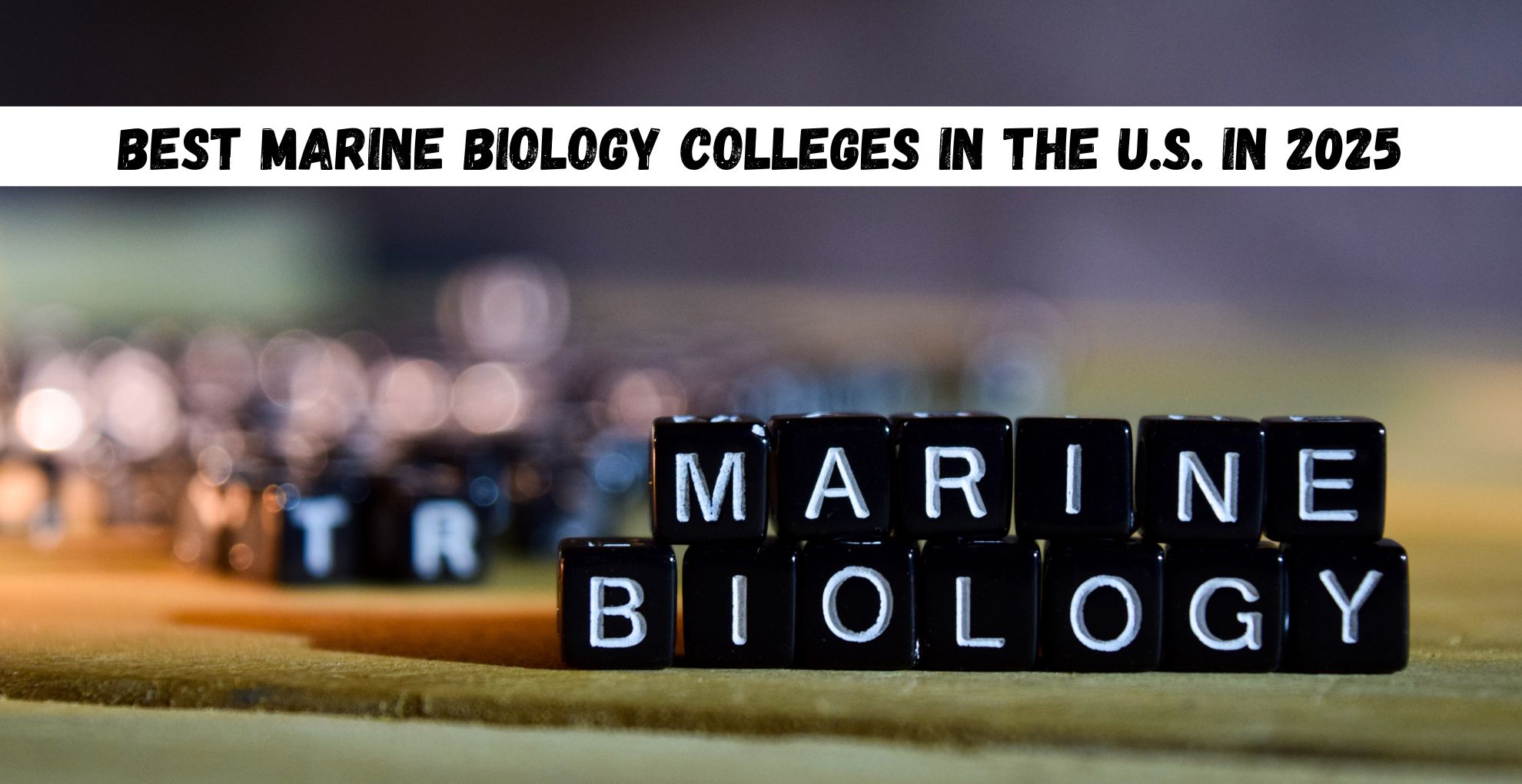Only over 5% of our globe has been investigated by scientists, despite the water covering over 70% of it. Amazing secrets, undiscovered information, and a delicate balance of life that impacts everything—from the food chain to the global climate—are hidden in that immense unknown. Studying marine biology can be your calling if you’re interested in deep-sea secrets, coral reefs, sea turtles, or the science behind ocean conservation.
But where you choose to study this awe-inspiring field matters more than you might think. Choosing one of the best marine biology colleges can shape your career, expand your knowledge, and connect you with cutting-edge research opportunities. In this article, we’ll dive into the top schools in the U.S. for marine biology in 2025, explore what makes them special, and offer some helpful guidance on how to choose the best fit for you.
Why Study Marine Biology?
A Field Full of Discovery and Impact
Even while dolphins and deep-sea diving are fascinating, marine biology is more than that. It involves comprehending the living systems found in seas, oceans, and coastal areas that sustain a remarkable variety of species. Researching anything from coral bleaching to endangered species, marine biologists are frequently on the front lines of environmental conservation.
Marine biologists work on almost every aspect of environmental science, from ocean pollution to climate change to sustainable fishing. It’s a line of work where you can use your enthusiasm to help save the environment.
Career Paths in Marine Biology
With a degree from one of the best marine biology colleges, you can pursue a range of exciting careers. These include:
- Marine researcher or oceanographer
- Environmental consultant or conservationist
- Aquatic veterinarian
- Marine policy advisor
- Marine science educator
Some marine biology graduates also find work in biotechnology, pharmaceuticals, or nonprofit environmental organizations.

What to Look for in a Top Marine Biology Program
Key Factors to Consider
You’ll want more than simply lovely ocean views while picking a school. The program’s depth and quality are important. Verify the school’s accreditation and academic standing in the marine sciences. Examine the qualifications of the teachers, the research produced by the students, and whether or not the graduates are working in the field.
Curriculum and Specializations
Every school has its unique take on marine science. While some provide a combination of marine ecology, conservation policy, and even underwater robots, others have a strong emphasis on oceanography. Think about what fascinates you. Do you prefer deep-sea exploration or coral reef ecosystems? Courses and labs specific to your field should be offered by your dream college.
Research and Fieldwork Opportunities
Hands-on experience is non-negotiable in this field. Whether you’re collecting samples in a tide pool or analyzing satellite data of ocean currents, real-world learning deepens your understanding and boosts your resume. Choose a program that encourages undergraduate research and has partnerships with labs, government agencies, or environmental organizations.
Facilities and Location
It helps if the school is close to the ocean, or at least a sizable body of water. Campuses with on-site marine labs, aquariums, research vessels, or dive programs offer immersive learning environments that can’t be matched by textbooks.
Scholarships and Financial Support
Marine biology isn’t a cheap degree, but plenty of scholarships are out there. Schools with marine science departments often offer awards for students pursuing ocean studies. You can also explore external platforms, which host exclusive scholarships for students interested in marine sciences.

Top U.S. Colleges for Marine Biology in 2025
University of Washington (Seattle, WA)
Ranked among the top ten globally for marine and freshwater biology, the University of Washington combines a world-class research environment with stunning access to the Pacific Northwest’s diverse ecosystems. The School of Aquatic and Fishery Sciences offers robust programs in marine ecology and conservation science.
Scripps Institution of Oceanography (UC San Diego, CA)
Scripps is synonymous with ocean science. A part of UC San Diego, it’s one of the world’s oldest and most respected centers for oceanography. Students here work alongside global researchers on projects that tackle climate change, deep-sea geology, and marine biodiversity. It’s a paradise for students who want to turn curiosity into a serious scientific discovery.
University of Miami – Rosenstiel School (Miami, FL)
The Rosenstiel School is nestled in one of the most biologically diverse marine environments in the U.S. Its programs in marine, atmospheric, and earth sciences are ideal for students who want to study coral reefs, hurricanes, and oceanic systems. The school also offers GRE-waived master’s and Ph.D. programs, which makes it accessible for graduate applicants.
University of California, Santa Cruz (Santa Cruz, CA)
With its proximity to Monterey Bay, UC Santa Cruz is a standout among marine biology colleges. The school offers specialized courses in marine mammalogy, intertidal ecology, and ocean technology. It also partners with the world-renowned Monterey Bay Aquarium Research Institute (MBARI).
Florida Institute of Technology (Melbourne, FL)
Florida Tech is home to one of the first marine biology undergraduate programs in the nation. Its BS in Marine Biology and Marine Conservation degrees offer strong fieldwork components. Students study dolphins, coral reefs, and sea turtles up close, thanks to the school’s easy access to Florida’s Atlantic coast.
University of Hawaii at Manoa (Honolulu, HI)
If tropical marine life is your passion, this school offers a living laboratory like no other. With research programs focused on coral reef restoration, fisheries biology, and ocean health, it’s ideal for students who want to make a difference in Pacific Island marine ecosystems.
Other Strong Contenders
Other marine biology colleges worth mentioning include:
- Duke University (NC): Offers fieldwork at the Duke Marine Lab
- Oregon State University (OR): Known for oceanographic research
- Stony Brook University (NY): Strongest estuarine and coastal ecology focus
- University of Maine (ME): Specializes in cold-water marine systems
- University of Alaska Fairbanks: Perfect for Arctic marine research
Types of Marine Biology Degrees
Undergraduate Programs
Most students start with a Bachelor of Science in Marine Biology. Some schools also offer a Bachelor of Arts, which blends marine studies with humanities or policy. Two-year associate degrees and technical certificates, like the Marine Diving Technician program at Santa Barbara City College, are also available for students looking to enter the workforce quickly.
Graduate-Level Degrees
For those aiming for research or academia, a Master of Science (MS) or Ph.D. in Marine Biology is essential. Many graduate programs include interdisciplinary options in marine law, sustainable development, or marine engineering.
Actionable Tips for Choosing the Right School
Align your passion with program strengths. If you’re into coral reefs, look for schools near tropical waters like the University of Miami. Interested in fisheries? Oregon State is a great choice.
Speak with faculty or current students. This will give you an inside view of the program’s culture, support system, and opportunities.
Review job placement and alumni outcomes. Are grads getting hired by NOAA, research labs, or conservation groups? That’s a strong indicator of program quality.
Consider visiting the campus. If possible, tour labs, talk to professors, and get a feel for the environment where you’ll spend the next few years.

FAQs About Marine Biology Colleges
What is the best college for marine biology in the U.S.?
That depends on your interests. For overall excellence, schools like the University of Washington, UC San Diego (Scripps), and the University of Miami consistently rank high due to their research output, expert faculty, and real-world access to marine ecosystems.
Do I need a graduate degree to work in marine biology?
Not necessarily. Entry-level roles in conservation, education, or research assistance often require only a bachelor’s degree. However, research or university-level roles usually require a master’s or Ph.D.
Are there marine biology colleges away from the ocean?
There are, but access to water is a major advantage in this field. Some inland schools offer great coursework and partner with coastal institutes for fieldwork.
Can I get scholarships to study marine biology?
Absolutely. Many universities offer departmental scholarships for marine science students. External sources also provide scholarships targeted at ocean studies.
Final Thoughts: Navigating Your Future in Marine Biology
Selecting the best marine biology college is a significant choice, but it also marks the start of an exciting and fulfilling adventure. There is a curriculum out there that meets your objectives, whether you are interested in marine robotics, coral reefs, or ocean conservation. With the correct training, practical experience, and an inquisitive mindset, you’ll be ready to investigate the secrets of the water and possibly even contribute to their rescue.
You can make your love of the sea your life’s work. And the first step is the college you select. Do your homework, ask questions, and have faith that a wave is out there just waiting for you to ride it.




